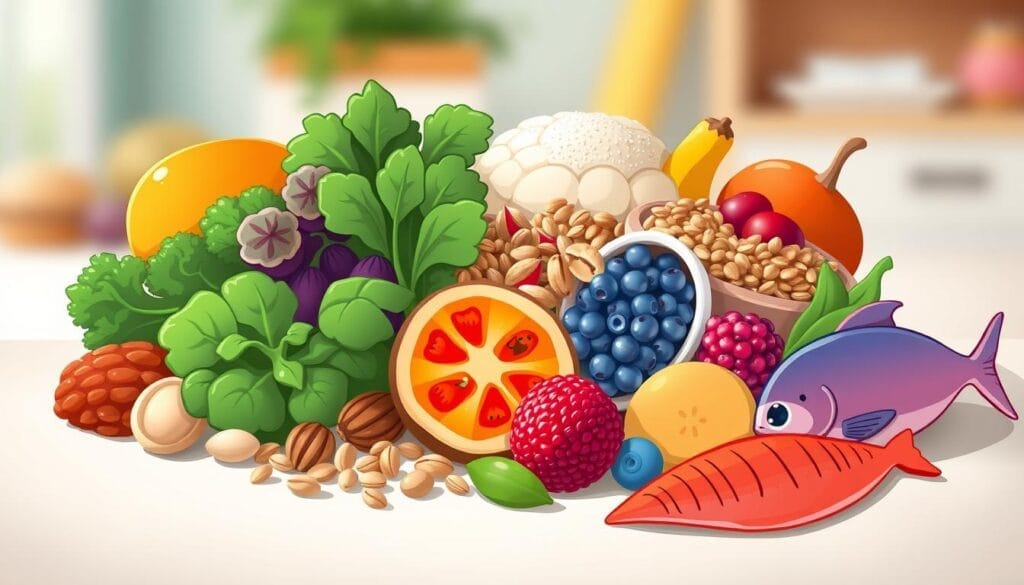Is your child’s food helping their brain grow or slowing it down?
Parents across the world want their kids to succeed, in school, in sports, and in life. But few realize that one of the most important keys to brain development sits right on their plate. Yes, food isn’t just fuel; it’s brain-building material.
From what your child eats at breakfast to the snacks they munch on after school, every bite matters. The diet and childhood cognitive growth connection isn’t just a theory, it’s backed by science, stats, and real-life cases.
In this blog, we’ll explore how everyday nutrition shapes thinking skills, memory, behavior, and even IQ levels. Whether you’re a concerned parent, teacher, or health enthusiast, you’ll walk away with easy, evidence-backed ways to support your child’s brain with food.
Table of Contents
ToggleWhat is Childhood Cognitive Growth?
Cognitive development in young children is complex and fascinating. It includes skills like attention, memory, and thinking. As their brains grow, these skills get better, helping them succeed in school and life.
Defining Cognitive Growth in Children
Cognitive growth means kids get better at understanding and solving problems. Research shows that how well a child thinks at preschool age can predict their school success. This is because their brain changes a lot in early years.
Importance of Cognitive Development
Cognitive development is very important for kids. As their brain grows, different parts develop at different times. For example, the parts that help with thinking and learning grow a lot in the first two years, then again between 7-9 and around 15.
Studies link early physical growth, like head size, to how well kids think at age 2. Birth weight and how fast kids grow early on also matter for their thinking skills. Knowing how child psychology, parental guidance, brain function, and cognitive skills work together is key to helping kids grow.
As kids play and talk with others, they start to understand the world. They learn to predict and explain things. This early learning is the base for future success in school and life.
Why Does Nutrition Matter for a Child’s Brain Development?
Your child’s brain is like a sponge. It grows fast, so it needs the right building blocks. Those building blocks? Nutrients from food.
Let’s see how brain development works to understand why the diet and childhood cognitive growth link is so powerful.
How Does the Brain Develop in Early Childhood?
Your child’s brain grows the most in the early years. By the time they’re five, most of their brain is already developed.
Quick facts:
- 90% of brain development happens before age 5
- Brain cells connect rapidly in the early years to build memory, attention, and language skills
- The brain uses more than 50% of the body’s energy in the first few years
That’s why giving the brain the right nutrients early on is critical.
What Happens When the Brain Lacks Nutrients?
A poor diet doesn’t just make kids feel tired, it slows down their brain development.
- Children with poor diets show delays in cognitive milestones like speaking, understanding, and problem-solving
- Studies show undernourished kids often have lower IQs and weaker memory
- The effects of poor nutrition on brain development can last into adulthood
A UNICEF report found that over 200 million children globally do not reach their full brain potential because of poor diets.
Case study: In rural India, undernourished children aged 3-6 years scored 30% lower in problem-solving tasks than their well-nourished peers.
Read: Child Health Risks And Health Checkup

Which Nutrients Are Essential for Childhood Cognitive Growth?
Good food is key for kids’ brains to grow. Some foods are especially good for brain health and thinking skills.
Omega-3 Fatty Acids
Omega-3s, especially DHA and EPA, make up large parts of the brain.
Simple facts:
- DHA builds brain cell walls
- EPA helps reduce inflammation that may harm brain function
- Kids who eat more omega-3s score better on memory and reading tests
Sources of omega-3 for cognitive development:
- Fatty fish (salmon, sardines)
- Walnuts
- Flaxseeds and chia seeds
Antioxidants
Antioxidants like vitamins C and E protect the brain. They fight off damage that can hurt thinking. Fruits, veggies, and whole grains are full of these brain-protecting nutrients.
Vitamins and Minerals
Important vitamins and minerals are vital for the brain. Iron, zinc, iodine, and vitamin B12 help the brain work right. Iron, zinc, and iodine support brain health, while vitamin B12 helps make important brain chemicals.
Eating these foods helps kids think better and do well in school. Giving kids the right nutrients helps their brains grow strong for learning all their lives.
Breakfast: The Most Important Meal for Kids
Eating a nutritious breakfast is key for kids’ brains and school work. Studies link breakfast to better cognitive function. This includes memory and focus. Breakfast gives kids the vitamins and minerals they need for a sharp mind all day.
How Breakfast Affects Concentration
Having breakfast regularly can make a child’s diet better. A study in Chile found that kids who skipped breakfast did worse in school. Those who ate well before school did better.
Nutrient-Rich Breakfast Options
- Whole-grain cereals with milk and fruit
- Eggs with whole-wheat toast and avocado
- Oatmeal with nuts, seeds, and berries
- Greek yogurt with granola and fresh fruit
These breakfasts are full of good stuff for kids’ brains and school work. A healthy breakfast helps kids do well all day.

The Impact of Sugary Foods on Cognitive Abilities
Too much sugar can hurt a child’s brain power. Studies show that too much sugar can make blood sugar levels go up and down fast. This can make it hard to focus and pay attention.
Understanding Sugar’s Effect on Brain Function
The brain needs a steady flow of glucose to work well. But eating too much sugar can mess with this. High sugar levels can change the brain and hurt learning and memory, especially in the hippocampus.
Research on rats shows that sugar can hurt memory. Also, eating sugar early in life can harm learning and memory in the brain.
Alternatives to High-Sugar Snacks
- Whole fruits: They are sweet and full of fiber, making them a better choice than sugary snacks.
- Vegetables with hummus: Mixing veggies with protein-rich hummus can curb cravings and boost brain health.
- Nuts and seeds: These snacks are full of nutrients and give energy, helping the brain work better.
Choosing healthier snacks can help kids think better and feel better. Parents and caregivers can make a big difference by picking the right foods.
Read: Lack of Protein in Indian Diet: Causes, Symptoms, and Solutions
The Importance of Hydration for Brain Health
Drinking enough water is key for a healthy brain. Even a little dehydration can hurt how well we think and remember. It’s important to drink water all day and eat foods with lots of water too.
Effects of Dehydration on Cognitive Performance
Dehydration can make kids feel tired, sleepy, and grumpy. It can also make it hard to focus. Drinking water helps fix these problems, but it takes time.
Strategies for Keeping Children Hydrated
- Encourage regular water intake throughout the day, aiming for at least 1.2 liters per day.
- Offer water-rich foods like fruits and vegetables, such as watermelon, oranges, and cucumbers.
- Limit sugary beverages and encourage water or milk as the primary drinks.
- Remind children to drink water before and during physical activity or in hot weather to replace fluids lost through sweat.
- Monitor children’s hydration status by looking for signs like dark urine, headaches, or fatigue.
Drinking enough water is vital for our brains and mood. By making sure kids drink enough, we help their brains stay healthy and happy.
The Link Between Whole Foods and Academic Success
Whole foods are key for kids’ brains and school success. They are not processed much and full of good nutrients. These foods help the brain work its best.
Defining Whole Foods
Whole foods are natural and full of nutrients. They are not changed much from their natural state. This means they have more vitamins, minerals, and healthy fats than processed foods.
Examples of Brain-Boosting Whole Foods
- Berries: Full of antioxidants, berries help with memory and focus.
- Leafy Greens: Foods like spinach and kale are packed with nutrients for the brain.
- Fatty Fish: Fish like salmon are great for brain health because of omega-3s.
- Nuts and Seeds: These foods are full of good fats and vitamins for the brain.
Eating these foods can really help kids do well in school. It’s good for their brain and learning.
What Are the Best Brain-Boosting Foods for Kids?
Want to pack your child’s lunch with smart choices? Focus on a mix of protein, good fats, fiber, and key vitamins.
What Should Be in a Cognitive-Friendly Lunchbox?
Here’s a simple table to guide you:
| Food Item | Key Nutrient | Brain Benefit |
|---|---|---|
| Boiled eggs | Choline, protein | Builds memory center in the brain |
| Whole wheat roti | B-vitamins, fiber | Supports nerve function |
| Nuts (almonds) | Vitamin E, omega-3 | Boosts focus and brain protection |
| Yogurt | Probiotics, calcium | Improves mood and reduces anxiety |
| Fruits (berries) | Antioxidants, vitamin C | Improves memory and thinking speed |
Are Plant-Based Diets Effective for Child Brain Growth?
Yes if planned well.
- Vegetarian children can still get enough nutrients for child brain development
- Use foods like tofu, lentils, seeds, whole grains
- Consider B12 supplements if needed
Plant-based diets are safe, but careful planning is needed to protect diet and childhood cognitive growth.
The Role of Family Meals in Brain Development
Mealtime is key for a child’s brain growth. It’s where they learn to talk and bond with family. Family meals help kids eat well and do better in school. They also learn to behave better.
Benefits of Eating Together
Family meals are great for kids’ brains. Parents can teach them about food and healthy eating. This helps kids speak better, solve problems, and feel good emotionally.
How Family Meals Encourage Healthy Eating Habits
- Parents can show kids the right foods to eat.
- Kids try new foods and eat a variety.
- They help make meals, which makes them appreciate food more.
- Meals are a chance for family bonding and learning about food.
Regular family meals help kids grow smart and healthy. This way of eating and learning together is very important. It helps kids do well in school and feel good.

The Influence of Diet on Mental Health in Children
Research shows a strong link between diet and mental health in kids. Studies have found that what kids eat affects their mood, emotions, and brain function.
Connection Between Diet and Mood
A study from Norway involved over 40,000 people. It found that a healthy diet in moms during pregnancy helps kids avoid depression and anxiety at age 8. It also showed that a healthy diet makes kids more outgoing, kind, and creative.
Foods That Support Emotional Well-Being
- Omega-3 fatty acids in oily fish help kids feel better and may prevent mental health issues.
- B vitamins in whole grains, greens, and lean meats are key for kids’ emotions and thinking.
- Zinc and magnesium in plants and lean meats boost mood and emotional health in kids.
Experts say a diet full of nutrients is vital for kids’ mental health. Parents can help by teaching kids to eat well. This way, kids can stay mentally healthy and emotionally balanced as they grow.
Cultural Dietary Practices and Cognitive Development
Diet and brain growth are linked, not just by nutrients but by cultural food ways. Across the globe, different groups have special food traditions. These traditions nourish the body and help the brain grow in kids.
Exploring Diverse Diets Around the World
Cultures that focus on traditional foods use many nutrients good for the brain. The Mediterranean diet, for example, is full of omega-3s, antioxidants, and fiber. Diets in Asia and Africa also include herbs, fermented foods, and lots of plants, which might help the brain.
Lessons from Traditional Diets
- Traditional diets worldwide help brain growth and prevent malnutrition, which harms brain development.
- These diets often have lots of different foods, which is key for brain health.
- Research shows that cultural foods, like breast milk and animal products, boost kids’ brain skills.
- Looking into traditional diets can teach us how to improve nutrition and brain health globally.

Learning about cultural diets and brain growth can help us use traditional foods better. This can support the health and growth of children everywhere.
What Does the Research Say About Diet and Childhood Cognitive Growth?
Let’s explore some trusted studies to understand more.
What Are the Most Recent Studies Showing?
| Study | Population | Key Finding | Source |
| Harvard 2020 | 1,300 kids | Breakfast improved math scores by 25% | Harvard.edu |
| WHO 2021 | 12 countries | Iron deficiency = lower IQ scores | WHO.int |
| NIH 2022 | US Teens | Omega-3 linked to better memory | NIH.gov |
These studies prove that the diet and childhood cognitive growth link is backed by hard science.
Are There Any Contradictory Findings?
Some say genes affect brain growth more than food. But recent research confirms:
- Genes set the stage
- Food builds the brain
So while DNA is a factor, diet plays a huge role, especially in early years.
Fostering Cognitive Growth Through Diet
Good nutrition is key for kids’ brain growth. Foods rich in omega-3, iron, zinc, and iodine help the brain work best. Eating whole foods, drinking enough water, and making healthy food choices are good for kids’ brains.
Summary of Key Points
This article showed how diet affects kids’ brains. Omega-3s, antioxidants, and healthy breakfasts are good. But too much sugar is bad. Schools and communities can help kids eat better and do better in school.
Encouraging Healthy Eating Habits in Children
Parents need to teach kids about healthy eating. Introduce many whole foods, eat together, and drink water. This helps kids grow smart and healthy. Working with local groups can give kids more help to grow their brains.
FAQ
What is the importance of nutrition for childhood cognitive growth?
Good nutrition is key for kids’ brains to grow. Foods rich in omega-3, iron, zinc, and iodine help with learning and thinking.
How does malnutrition affect cognitive development in children?
Not getting enough nutrients can harm a child’s brain. It can lead to lower grades and less success later in life.
What are the key nutrients required for optimal brain development?
For a healthy brain, kids need omega-3, vitamin B12, and folic acid. Choline, iron, iodine, and zinc are also important. They help with brain growth and function.
How does breakfast consumption affect cognitive performance in children?
Eating breakfast boosts kids’ memory and focus. Foods high in vitamins and minerals help their brains work better all day.
What is the impact of sugar consumption on cognitive abilities in children?
Too much sugar can mess with kids’ brains. It can make them feel tired and upset. Better choices include fruits, veggies, nuts, and seeds.
How does proper hydration affect brain function in children?
Even a little dehydration can hurt kids’ brains. Drinking water and eating foods with water helps keep them sharp.
What is the connection between whole foods and academic success in children?
Whole foods like berries and nuts help kids learn better. They’re full of nutrients that support brain health.
How do family meals contribute to cognitive development in children?
Family dinners help kids talk and learn. They also teach healthy eating habits. This can improve school grades and behavior.
What is the relationship between diet quality and mental health in children?
Eating well is linked to better mood and mental health in kids. Foods rich in omega-3 and B vitamins help with feelings.
How do cultural dietary practices influence cognitive development in children?
Traditional diets often have foods good for the brain. Trying different diets can show us how to support brain health.
About The Author

Medically reviewed by Dr. Chandril Chugh, MD, DM (Neurology)
Board-Certified Neurologist
Dr. Chandril Chugh is a U.S.-trained, board-certified neurologist with expertise in diagnosing and managing neurological disorders, including migraines, epilepsy, Parkinson’s disease, and movement disorders. His clinical focus includes evidence-based neurological care and patient education.
All content is reviewed for medical accuracy and aligned with current neurological guidelines.




